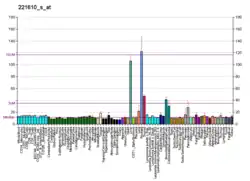STAP2
Signal-transducing adaptor protein 2 is a protein that in humans is encoded by the STAP2 gene.[5][6][7]
| STAP2 | |||||||||||||||||||||||||
|---|---|---|---|---|---|---|---|---|---|---|---|---|---|---|---|---|---|---|---|---|---|---|---|---|---|
| |||||||||||||||||||||||||
| Identifiers | |||||||||||||||||||||||||
| Aliases | STAP2, BKS, signal transducing adaptor family member 2 | ||||||||||||||||||||||||
| External IDs | OMIM: 607881 MGI: 2147039 HomoloGene: 9798 GeneCards: STAP2 | ||||||||||||||||||||||||
| |||||||||||||||||||||||||
| |||||||||||||||||||||||||
| |||||||||||||||||||||||||
| |||||||||||||||||||||||||
| Orthologs | |||||||||||||||||||||||||
| Species | Human | Mouse | |||||||||||||||||||||||
| Entrez | |||||||||||||||||||||||||
| Ensembl | |||||||||||||||||||||||||
| UniProt | |||||||||||||||||||||||||
| RefSeq (mRNA) | |||||||||||||||||||||||||
| RefSeq (protein) | |||||||||||||||||||||||||
| Location (UCSC) | Chr 19: 4.32 – 4.34 Mb | Chr 17: 56 – 56.01 Mb | |||||||||||||||||||||||
| PubMed search | [3] | [4] | |||||||||||||||||||||||
| Wikidata | |||||||||||||||||||||||||
| |||||||||||||||||||||||||
This gene encodes the substrate of breast tumor kinase, an Src-type non-receptor tyrosine kinase. The encoded protein possesses domains and several tyrosine phosphorylation sites characteristic of adaptor proteins that mediate the interactions linking proteins involved in signal transduction pathways. Alternative splicing results in multiple transcript variants.[7]
References
- GRCh38: Ensembl release 89: ENSG00000178078 - Ensembl, May 2017
- GRCm38: Ensembl release 89: ENSMUSG00000038781 - Ensembl, May 2017
- "Human PubMed Reference:". National Center for Biotechnology Information, U.S. National Library of Medicine.
- "Mouse PubMed Reference:". National Center for Biotechnology Information, U.S. National Library of Medicine.
- Mitchell PJ, Sara EA, Crompton MR (Oct 2000). "A novel adaptor-like protein which is a substrate for the non-receptor tyrosine kinase, BRK". Oncogene. 19 (37): 4273–82. doi:10.1038/sj.onc.1203775. PMID 10980601.
- Dehal P, Predki P, Olsen AS, Kobayashi A, Folta P, Lucas S, Land M, Terry A, Ecale Zhou CL, Rash S, Zhang Q, Gordon L, Kim J, Elkin C, Pollard MJ, Richardson P, Rokhsar D, Uberbacher E, Hawkins T, Branscomb E, Stubbs L (Jul 2001). "Human chromosome 19 and related regions in mouse: conservative and lineage-specific evolution". Science. 293 (5527): 104–11. doi:10.1126/science.1060310. PMID 11441184. S2CID 826987.
- "Entrez Gene: STAP2 signal-transducing adaptor protein-2".
Further reading
- Rosenzweig BL, Imamura T, Okadome T, et al. (1995). "Cloning and characterization of a human type II receptor for bone morphogenetic proteins". Proc. Natl. Acad. Sci. U.S.A. 92 (17): 7632–6. doi:10.1073/pnas.92.17.7632. PMC 41199. PMID 7644468.
- Strausberg RL, Feingold EA, Grouse LH, et al. (2003). "Generation and initial analysis of more than 15,000 full-length human and mouse cDNA sequences". Proc. Natl. Acad. Sci. U.S.A. 99 (26): 16899–903. doi:10.1073/pnas.242603899. PMC 139241. PMID 12477932.
- Minoguchi M, Minoguchi S, Aki D, et al. (2003). "STAP-2/BKS, an adaptor/docking protein, modulates STAT3 activation in acute-phase response through its YXXQ motif". J. Biol. Chem. 278 (13): 11182–9. doi:10.1074/jbc.M211230200. PMID 12540842.
- Yamamoto T, Yumioka T, Sekine Y, et al. (2003). "Regulation of FcepsilonRI-mediated signaling by an adaptor protein STAP-2/BSK in rat basophilic leukemia RBL-2H3 cells". Biochem. Biophys. Res. Commun. 306 (3): 767–73. doi:10.1016/S0006-291X(03)01042-8. PMID 12810085.
- Ota T, Suzuki Y, Nishikawa T, et al. (2004). "Complete sequencing and characterization of 21,243 full-length human cDNAs". Nat. Genet. 36 (1): 40–5. doi:10.1038/ng1285. PMID 14702039.
- Gerhard DS, Wagner L, Feingold EA, et al. (2004). "The status, quality, and expansion of the NIH full-length cDNA project: the Mammalian Gene Collection (MGC)". Genome Res. 14 (10B): 2121–7. doi:10.1101/gr.2596504. PMC 528928. PMID 15489334.
- Sekine Y, Yamamoto T, Yumioka T, et al. (2005). "Physical and functional interactions between STAP-2/BKS and STAT5". J. Biol. Chem. 280 (9): 8188–96. doi:10.1074/jbc.M411692200. PMID 15611091.
- Sekine Y, Tsuji S, Ikeda O, et al. (2007). "Signal-transducing adaptor protein-2 regulates integrin-mediated T cell adhesion through protein degradation of focal adhesion kinase". J. Immunol. 179 (4): 2397–407. doi:10.4049/jimmunol.179.4.2397. PMID 17675501.
This article is issued from Wikipedia. The text is licensed under Creative Commons - Attribution - Sharealike. Additional terms may apply for the media files.




